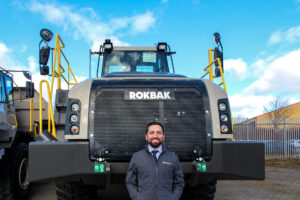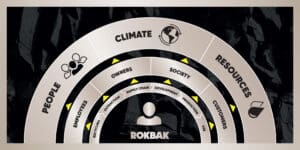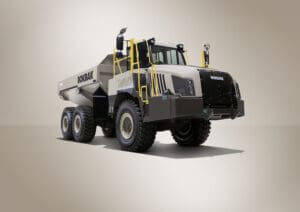At the heart of its sustainability strategy, Rokbak has implemented a set of ambitious goals in operating measures and articulated hauler design and construction. These underscore a determination to reduce environmental impact and promote sustainable practices – all of which benefit the company’s valued customers.

A commitment to minimising its ecological footprint has seen the sustainability goals of Scottish articulated hauler manufacturer Rokbak showcase a dedication to environmental stewardship in the heavy machinery industry.
“A lot of work has gone into our sustainability drive over the years,” says Charlie Urquhart, Rokbak Product Manager. “Rokbak’s heritage, knowledge and resources mean that we’re constantly developing and looking to improve the trucks and the way we operate, in a manner that benefits our customers.”
As part of the Volvo Group, Rokbak is aligned to the Science Based Targets initiative (SBTi). Specific aims include a 30% reduction in CO₂ by 2030, a 50% factory operations emission reduction by the same year and becoming net-zero by 2040. These incentives have influenced the design of Rokbak trucks, the daily operation of the Rokbak Motherwell factory and a strict adherence to the Rokbak sustainability roadmap.
Reducing impact on the environment has seen Rokbak employ strategies stemming from fuel consumption analysis, examining alternative fuels, extending maintenance cycles and lessening maintenance consumables. Furthermore, this research and development in sustainability has led to the reduction of total cost of ownership (TCO) for Rokbak customers.

Low waste, low cost, high performance
Fuel consumption is the biggest cost of operating a machine and the Rokbak RA30 and RA40 EU Stage V engines produce a fuel consumption saving of up to 7%, when compared to the previous EU Stage IV engines. This means lower operating costs and, fundamentally, less impact on the environment. Rokbak’s articulated haulers both have lean burning engines and a confirmed low-fuel consumption. The RA40 has a class-leading transmission fluid change interval of 6,000 hours, the RA30 offers an impressive 4,000 hours.
Both the RA30 and RA40 are compatible with hydrotreated vegetable oil (HVO), a fuel that allows customers a ‘quick-hit’ on their individual net-zero targets. HVO, also referred to as “Renewable Diesel” or “Green Diesel”, is a paraffinic bio-based diesel fuel originating from animal fats or multiple vegetable oils (waste cooking oil, rapeseed oil, palm oil, etc). HVO fuel has chemical and physical properties like those of diesel fuel, however, its fossil-free composition and low carbon content differentiate it from diesel and make it attractive to those seeking a sustainable fuel option. It is a modern way to produce high-quality bio-based diesel fuels without compromising fuel logistics, engines, exhaust aftertreatment devices, or exhaust emissions. HVO can provide up to a 90% reduction in CO₂ emissions on a well-to-wheel analysis.
Extensive periods between scheduled maintenance, with infrequent parts and fluid changes, mean less material going to landfill. Maintenance and fault alerts allow customers to keep on top of the truck and be informed of the machine’s next required servicing. Instigating the ordering of parts in advance and getting the labour in place increases operational efficiency, not only improving sustainability measures but also reducing TCO.
“When the customer buys a Rokbak hauler, they are acquiring a hauler that has been developed with sustainability in mind.” says Charlie. “It is a hauler that has been manufactured on a site powered by green energy and redirects waste away from landfill.”

Collective effort
Today, the Rokbak factory is completely powered by sustainable sources. Working towards accreditation on a zero-waste-to-landfill policy, 95% of generated waste is now diverted away from landfill.
Rokbak’s sustainability initiatives resonate with employees from the factory to the management team and the company’s dealers and customers. Everyone from the factory floor to the head office has an eye on energy reduction. Internal trackers inform Rokbak employees how much energy has been used in comparison to the previous week and “green champions” are recruited from throughout the business to promote sustainable practices in their respective work areas.
“It’s to make sure everyone’s doing their bit,” explains Charlie. “Whether you’re monitoring power tools usage or remembering to switch off the lights and air conditioning, you’re part of a united drive.”
Rokbak’s sustainability goals and incentives exemplify how we can address environmental challenges within the heavy machinery industry. Rokbak demonstrates the potential for sustainable manufacturing while reaping a host of benefits and stands as an example of how other movers in the manufacturing industry can drive positive change while securing individual success.
“We are creating significant steppingstones towards a sustainable future,” says Charlie. “And this not only results in less waste being generated, but also benefits the Rokbak customer’s wallet.”